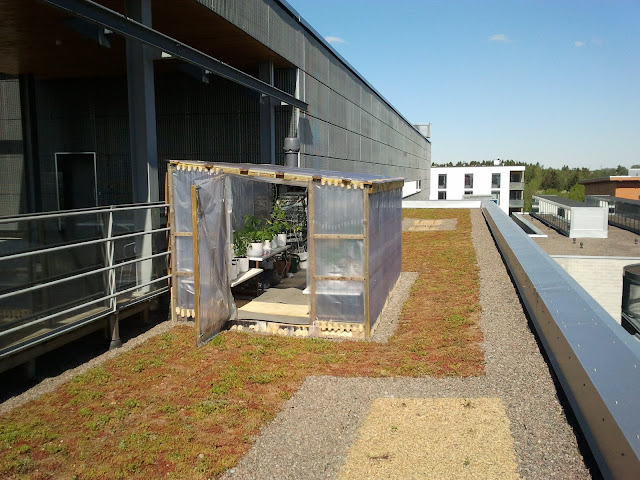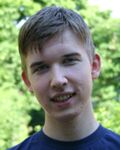Jiaheng Lu: our new Associate Professor
Jiaheng Lu (JL) has been nominated as a tenure-track Associate Professor in computer science for a period of five years starting on August 1, 2015. Recruiting foreign professors is an important tool in the internationalization efforts of the University, so a thorough introductory interview by the head of the Department (JP) was a must.
JP: What have you been doing for the past few years?
JL: I finished my PhD studies at the National University of Singapore in 2006. And then I went to the U.S. for two years’ postdoctoral research at the University of California, Irvine. In 2008, I went back to China and joined the Renmin University of China. I was promoted exceptionally as a full professor there in 2012 due to my good teaching and research performance.
JP: Why did you apply for the post here?
JL: First of all, I’d say because the University of Helsinki is one of the top universities in the world, and the Department of Computer science is an international center of excellence in computer science. I can have opportunities to collaborate with professors and students here. In addition, I like the country of Finland. The people here are very hospitable. An ancient Chinese philosopher, called Laozi, has said that “Govern by doing nothing that goes against nature”. I think that the government and education in Finland are consistent with this idea. So I like the culture and living style in Finland. The third thing is my family. My wife encouraged me to apply for this position, because the education in Finland is one of the best in the world and it would be very good if our children can grow up in Finland.
JP: You have been employed at universities both in China and Finland. What is their difference according to your experiences so far?
JL: To date, I do not feel any significant differences between the two universities. On the contrary, there are many things in common. As a professor, I have similar jobs in research and teaching. My research interests and topics are the same as before. A small difference is that most students and professors do not work on Saturdays and Sundays here, but in China I often had a group meeting with my students on Saturday or Sunday. Therefore, the working culture may be different.
JP: What are your special areas of research?
JL: My main research areas are data management and databases. A database is an organized collection of data. My primary goal is to improve the performance and usability of database systems. In the past ten years, I have been working on XML databases, textual databases and spatial databases. My current research focuses on addressing the challenge on variety and volume of big data. First, variety means that data are drawn from different sources, including documents, Web, PDF, table, image, and even video. One challenge is to integrate and organize those types of heterogeneous data together to answer the users’ queries. Second, volume means that the size of data is very big. Therefore, we need to rely on distributed databases to do the jobs in parallel. Currently, Mapreduce and Spark are two representative platforms for share-nothing distributed computing. We study the efficient query processing based on those emerging platforms.
JP: What do you expect to experience here in Finland and at the Department?
JL: I will begin my work as an associate professor at the University of Helsinki in the area of data management and I plan to quickly establish my working group by recruiting new PhD students and postdoc researchers. This is a tenure-track position, which means I must work hard. I will apply for research funds from the Academy of Finland. Recently, I got to know some friends from an IT Company in Helsinki and I will work with them to find opportunities for collaboration. In the area of big data, there are many IT companies such as Eficode and Huawei, and many entrepreneurs, which is very promising for me. Furthermore, the contacts within the Department will include the areas of software systems. As some of my main topics such as big data processing can be seen as interdisciplinary, I also see potential in collaborating with experts in other areas such as algorithms and machine learning. I think that the Department of Computer Science at the University of Helsinki is an excellent environment for teamwork to achieve ambitious research. Although I have been here only for a few weeks, I have already experienced a lot of hospitality and would like to thank all of those who have supported me.
JP: Did you bring your family with you? How have you found Finland in general and the Finnish weather in particular?
JL: I will bring my wife and children with me to Helsinki in the near future. My wife is now studying for her PhD degree in Singapore and she will come here during the next year. The summer in Finland is very nice. It is warm, but the temperature is lower than that in Singapore and Beijing where the summer is often hot and humid. But it is warm and comfortable here. So I chose exactly the right time to come. On the other hand, autumn and winter are coming and temperatures already start dropping in September. But autumn months will turn Finland's forest landscape into a splendid and unforgettable array of gold, and the crisp winter days will see the beautiful frozen trees and lakes, and there are thrilling activities such as skiing and snowmobiling. So I look forward even to the coming of autumn and winter.
By the way, I am learning the Finnish language now. Finnish is easy to pronounce, but the spelling of vocabulary is quite different from English. The grammar is logical. I read a Finnish textbook (almost) every morning and enjoy my studying.
JP: Do you have any hobbies? What are your visions for golf?
JL: My main hobby is sports, and especially swimming and the gym. I go swimming and to the gym regularly each week. In addition, I like to read books about Chinese ancient philosophy, like Tao Te Ching by Laozi. My plan is to write some paper to discover the relationship between Tao Te Ching and computer science in the near future. With regard to golf, I am most interested in it. However, golf is very expensive in China so I have not practiced it there. In Finland, the golf courses are of high standard and the green fees more affordable so I would like to start playing golf next summer.


